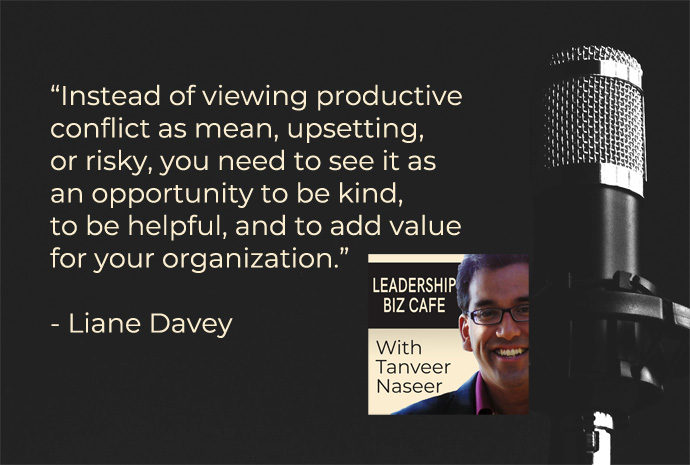Conflict is something most of us tend to avoid because we view it as being negative and counter-productive. But what if we’re seeing this wrong? Could conflict actually be productive and beneficial for our team? That’s the focus of my conversation with organizational psychologist and bestselling author Dr. Liane Davey in this episode of my leadership podcast, “Leadership Biz Cafe”.
Liane is the New York Times bestselling author of “You First: Inspire Your Team to Grow Up, Get Along, and Get Stuff Done.” She is also a regular contributor to the Harvard Business Review and an organizational psychology expert for Quartz magazine. As the co-founder of 3COze, she advises on business strategy and executive team effectiveness and has worked with executives at companies such as Amazon, Walmart, Aviva, TD Bank, 3M, and SONY PlayStation.
In this episode, we’ll be talking about her book, “The Good Fight: Use Productive Conflict to Get Your Team and Organization Back on Track”.
Over the course of this episode, Liane and I discuss:
- What is “conflict debt” and why we should be doing our best to avoid amassing this kind of debt.
- The three behaviours we all do that can fuel conflicts instead of addressing the underlying roots.
- Why it’s important to understand the difference between conflict aversion and conflict avoidance.
- Steps you can take today to reduce unnecessary workplace conflicts.
- Tapping into the power of connection to transform conflict into an opportunity to learn and understand.
So give this episode a listen and if you enjoy it, please do share it with others in our organization or your network so that they might also gain these insights on how to transform conflict from something that harms to something that helps.
Noteworthy Links:
- Buy Liane’s book “The Good Fight” on Amazon (or Amazon.ca for Canadian readers)
- Visit Liane’s company site: 3COze
- How Leaders Create The Right Environment To Resolve Team Conflicts
- 4 Keys To Successfully Resolving Conflicts in the Workplace
- 6 Steps To Strengthen Team Cohesion

